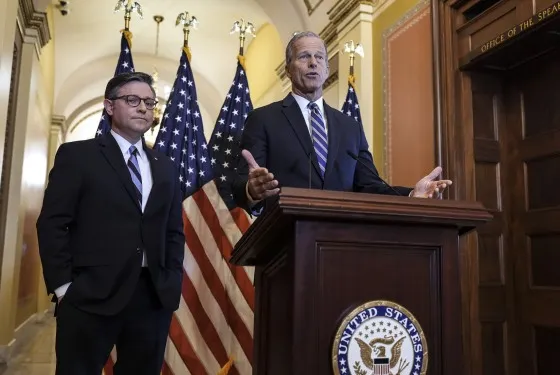Introduction
The Congressional Budget Office (CBO) recently released a report indicating that the GOP’s tax bill designed to fulfill former President Donald Trump’s agenda would significantly affect the national debt. According to the CBO, the proposal could add an astounding $2.4 trillion to the national deficit over the next decade, even as it promises tax cuts totaling $3.7 trillion.
Understanding the Implications
The details of the CBO’s report raise critical questions about the fiscal implications of such legislation. While the GOP argues that these tax cuts will stimulate economic growth, the CBO has emphasized the potential downsides, particularly concerning the national debt and long-term financial sustainability.
What the CBO Report Says
The CBO’s estimates are based on projections that consider various factors including economic growth, tax revenues, and government spending. They suggest that while tax cuts may invigorate the economy in the short term, the long-term consequences could lead to increased borrowing and a heavier burden on future generations.
Key Findings of the CBO:
- A projected $2.4 trillion increase in the national deficit over ten years.
- Tax cuts totaling $3.7 trillion would primarily benefit corporations and high-income earners.
- The anticipated economic growth could offset some costs but not enough to prevent an increase in the debt.
- Long-term fiscal health may be compromised as expenditures continue to rise without sufficient revenue from the tax cuts.
Perspectives on the Tax Bill
Supporters of the tax bill, mainly within the GOP, argue that the proposed tax cuts would lead to increased investment, job creation, and ultimately a boost in tax revenue that counters the deficit impact. They cite previous tax cuts as evidence that lowering taxes can invigorate the economy.
Critics, including many economists and budget analysts, counter that the tax cuts favored by Trump and the GOP disproportionately benefit higher-income individuals and corporate entities, which may not translate to broader economic growth. According to them, the projected revenue loss from these tax cuts will likely be permanent, leading to more significant deficits and increased national debt.
Historical Context
To put this report into context, it’s essential to understand the historical impact of tax cuts in the U.S. The Tax Cuts and Jobs Act of 2017, for example, resulted in a significant reduction in corporate tax rates, but it also led to rising deficits as many of the promised benefits failed to materialize as expected. The current projection is reminiscent of past patterns where promises of robust growth from tax reductions were ultimately not fulfilled.
The Political Landscape
This proposal is set against a complex political backdrop. The GOP is divided, with some members advocating for fiscal conservatism and caution regarding increasing the national debt, while others support aggressive tax cuts as part of an overarching economic strategy. Former President Trump’s influence remains significant in the party, driving a wedge between traditional conservatism and a more populist economic agenda.
Voters’ Response
The average American voter is increasingly concerned about the rising national debt. Surveys indicate that while some individuals may support tax cuts, most are equally wary of government overspending and its implications for future generations. This nuanced perspective may impact voter sentiment in upcoming elections, especially as fiscal health becomes more salient to constituents.
Economic Factors to Consider
Several economic factors play crucial roles in determining the outcomes of such tax policies. For instance, inflation rates, job creation, and interest rates will significantly influence the efficacy of tax cuts. With inflation already a concern in recent years, the net benefit of tax cuts must be evaluated carefully against current economic conditions.
Debt Ceiling Concerns
One of the most pressing issues looming over the economy is the debt ceiling. As the national debt approaches its limits, legislators must grapple with balancing the need for fiscal stimulation through tax cuts while maintaining responsibility toward the country’s financial health. The CBO’s numbers rekindle discussions about the need for comprehensive budget reforms to prevent an impending fiscal crisis.
Long-Term Implications
The long-term implications of this tax bill cannot be understated. Adding $2.4 trillion to the debt could carry catastrophic consequences, constraining future legislative action and necessitating cuts to important social programs that many Americans depend on. Budgetary trips could lead to increased taxes for future generations, stifling economic growth further.
Conclusion
The CBO’s findings present a stark warning regarding the GOP’s tax proposal and its potential ramifications on the economy and national debt. With stark divisions within the GOP and public opinion toggling between enthusiasm for tax cuts and concerns over the deficit, the next steps for Congress will be pivotal. Until lawmakers find a harmonious balance between stimulating economic growth and ensuring long-term fiscal health, the debate over tax cuts and deficits will likely persist.
Call to Action
As the CBO’s report underscores the challenging landscape ahead, it is essential for citizens to stay informed and engaged in discussions about fiscal policy. Understanding the implications of taxation on both current and future economic health is crucial in advocating for responsible governance.







